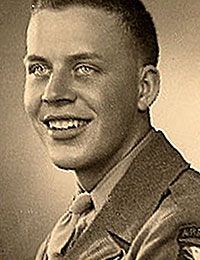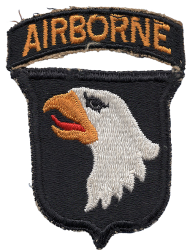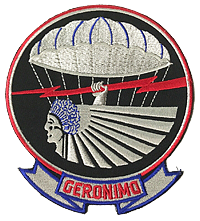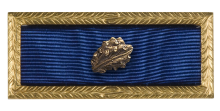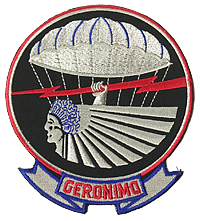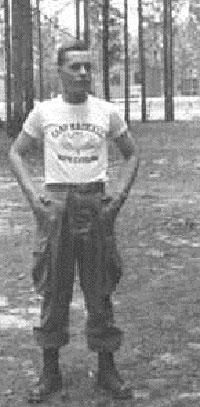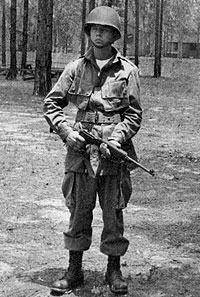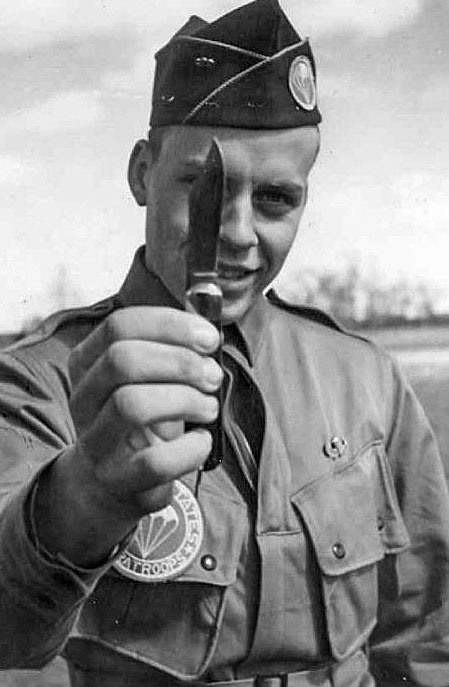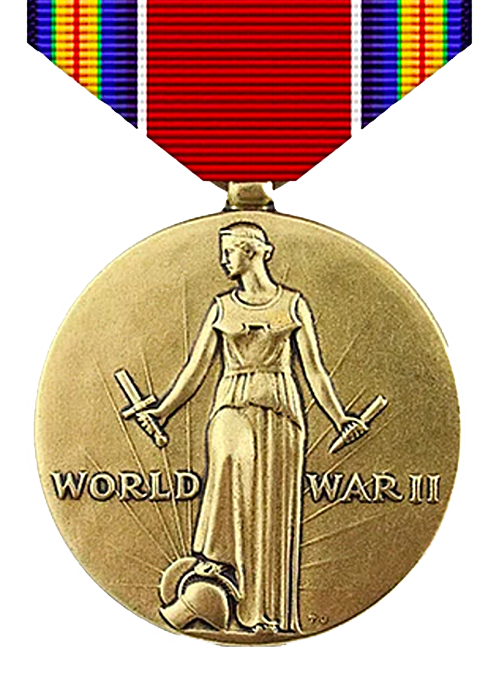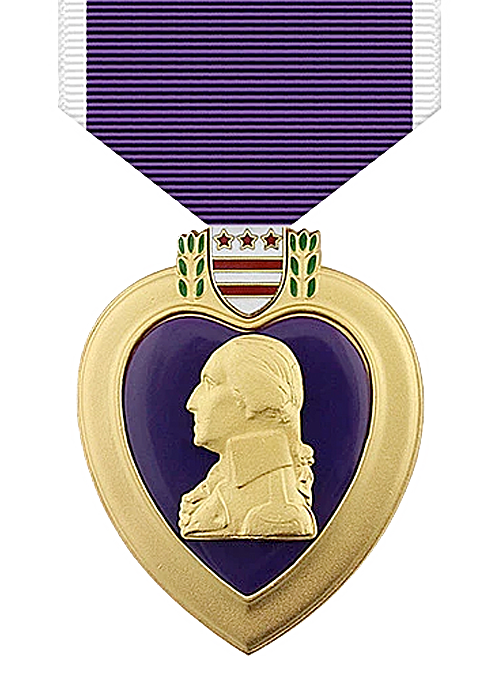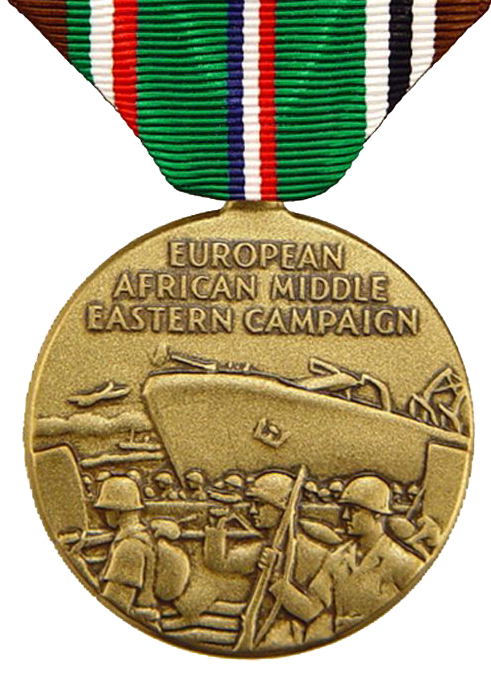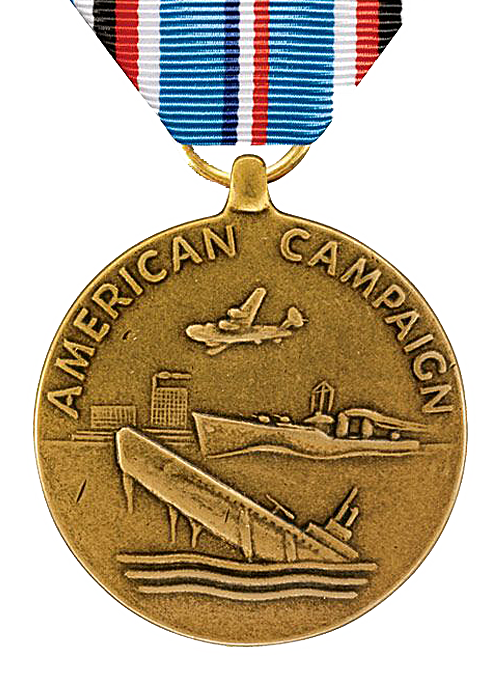On the other side in the city of Nijmegen a Limey convoy of trucks waited for us (we were still attached to the British Army). We got aboard and at 11:35 hours began the long trip back to a new base in France. As we rolled along through the French countryside and towns I reflected on my combat experiences and was pleased that I now had several “notches” on my rifle. We rode all afternoon and all night, arriving in the new camp at 0930 hours the following morning. It was a cold, miserable ride and no one got much sleep. The only excitement was watching the buzz bombs fly over on their way to England and the streams of tracers reaching up for them. Every now and then a flash on the horizon or in the sky would give proof that their efforts were not in vain. The other bit of excitement would occur whenever we passed through a large city, whereupon all on board would hang their heads out to admire and yell at the girls, and make caustic remarks to the rear echelon soldiers who had them in tow.
The children always wanted gum or candy and most men arrived at their destination devoid of these items. The civilian men would sometimes ask for American cigarettes, but most combat veterans wondered why they were not fighting for their country and were usually stingy about parting with their cigarettes. The girls were more apt to be successful in their plea for cigarettes. As the trucks rolled endlessly on and through small towns the men would yell at any young girls they saw on the streets or hanging out of windows.
We eventually arrived at a town called Mourmelon and de-trucked at what turned out to be some old barracks from WWI which had previously been occupied by the German Army. The buildings were well built of stone but the interior accommodations were sparse. We only had straw filled mattresses to sleep on and only a few light bulbs in each barracks for illumination. We settled down to getting used to sleeping on bunks again and enjoying the warmth of a red hot stove. New replacements arrived to fill our depleted ranks and training soon started so there was no rest yet. In fact, they began to get stricter than ever with the men, why I couldn’t understand, but it made life miserable. The men expected some sort of reward after seventy-two days in combat and began to feel bitter. All I could do was shrug my shoulders and say it was just another one of the aspects of belonging to the Paratroopers. The more eager men applied for passes so they could go and visit the town of Rheims, nearby, where General Eisenhower had his headquarters. I was not interested in this just yet, for I had a lot of letter writing to catch up on. New recruits were arriving daily and the old combat vets filled their ears with stories of what they could expect, many of them exaggerated for effect. Finally some men got passes to Rheims.
Unwinding after 72 days of combat got a little out of hand in Rheims and “Ike” got a bit irked. As a result the whole division was grounded and no more passes were issued. During this period I became infected with scabies, probably left in the straw mattresses by the retreating Germans. I had to report for sick call and was stripped of all my clothes, which had to be boiled, and then my body was covered with sulfur ointment from head to toe. I got to sleep in a clean hospital bed with white sheets on it; the only positive aspect of the whole ordeal.
This procedure was repeated after a few days to get the newly hatched eggs and then I was allowed to go back to duty. Despite the training, which most of the combat veterans now deemed unnecessary, and lots of calisthenics and running, the men were getting restless and the Commanders realized they would have to let the men out on pass. They decided to start from the top ranks and worked down, letting the Officers on pass first. If no one caused any trouble while out on pass they would work down to the next level of rank. It eventually came down to Corporals and I, along with Cpl. Dennis and Cpl. Cranford were given three day passes to Paris. When this threesome was set loose in Paris it resulted in some of the more memorable events in my young life. With a married older Buddy and a younger one, full of the devil, as guides and tutors I was treated to some experiences which would bring laughter to my soul for the rest of my life.
It was a time to forget the horrors of War and try and act as a normal human being again. After the Normandy campaign I was not entirely satisfied with my performance, having been wounded early on, before I could account for any of the enemy, which after all was my primary purpose for being there. Paratroopers were the elite of the armed services and everything in their training was aimed at making them believe they were the best. I now felt I satisfied those requirements and could walk among all the other branches of service I saw in Paris on leave and feel that I was better than the rest. More times than I care to remember a soldier from another branch of service would engage me in conversation and invariably say “Oh, I tried to get in the Paratroops but they wouldn’t take me.” This always seemed to me to be an apology for not having the guts to volunteer for the most hazardous duty the Army had to offer. My own hopes of coming out of the War alive were pretty slim when I signed up, but now things began to look brighter, and with a little more help from my “Little man with the halo” whom I claimed followed me around, I thought, possibly, I might just make it home alive. A lot of men had good luck charms to bolster their courage in battle. The oddest one, I thought, was a Buddy who tied a pair of his girl friends panties around his neck as a scarf. My own good luck charm was a teaspoon I had borrowed from my Mother’s every day set. It started out to be a substitute for my G.I. mess kit spoon which I deemed too large to eat with comfortably. I took it on jumps and it eventually came to mean more than I originally intended and I always made sure it was on my person for every jump.
But, to get back to my Paris pass; I was wary of drinking too much while on pass for fear of what might happen, but with two good Buddies to watch over me I loosened up and tried most of the French liquors, some good, most terrible. I also experimented with cigarettes and found they made my head whirl and my stomach rebel, magnifying the effects of the drinking. They showed me how to pick out the “business girls” as we roamed the sites of Paris. Things were getting pretty lively when word came that all Paratroopers were to report immediately to their camps. There went what could have been a memorable pass in Paris.
We had to find our way to the railroad station and get tickets for the first train back to Mourmelon. Arriving back in camp late at night we found it practically deserted with all but a few of the men gone. We had to pack our barracks bags and be prepared to move out at the crack of dawn. Next morning we were aboard six wheelers heading northwest towards a rumored German breakthrough. There were no Springfield bolt action rifles, my preference, in camp so I had to settle for a Garand M1 rifle. This one had no grenade launcher so I was not encumbered with any rifle grenades.
Into combat again
The convoy traveled in the general direction of Bastogne, our destination, but because of all the traffic, a lot of it in the opposite direction, we made little progress and eventually ended up in the town of Namur, northwest of Bastogne. Here the convoy stopped and waited for the roads to open up. We stayed in the town hall, a large building with hardwood floors upon which we would have to sleep. The men soon became acquainted with the local citizens who seemed more than willing to help our plight. They would invite us into their homes for food and drink and this passed away the time as we waited for what looked like, now, would be more combat for rumors were flying about of the German breakthrough. The second day I was invited into a home for a nice supper and was invited to stay the night and sleep in a feather bed. The homemade meal of fried potatoes and meat, though common, was a treat for me and reminded me of my Mother’s cooking back home. I whiled away the evening trying to communicate as best I could with these foreigners who spoke no English, but seemed genuinely interested in making an American soldier feel at home in their land. They knew I was there to keep their enemy from coming back, a prospect they feared, knowing the German’s methods of reprisal. I finally went to bed and was soon in a deep, though cautious, sleep in the feather bed. It seemed as if I were floating on a cloud. In the middle of the night I was awakened by the sound of truck motors starting up and moving away. I guessed it was the convoy but knowing I could never get dressed and back to the town hall in time, just rolled over and went back to a restless sleep. In the morning I had a good breakfast with my hosts, thanked them for their kindness, and walked back to the town hall to find my suspicions confirmed. I set about finding a ride on any trucks heading for Bastogne and soon was on my way again. I arrived in Bastogne late in the day and immediately looked up my Company command post which I found in the basement of a large church and school building in Bastogne. My first impression when I saw all the wounded soldiers lying about the main floor of the building in a large room with columns all around was that this must be a serious situation I was getting into and that I could expect some heavy action. I found my Company Commander, Capt. Rhett, and reported in explaining why I was late. The Capt. gave me a stern reprimand and reminded me that I could be shot for desertion! I was shocked at this and my only answer was, “Sir! If I intended to desert I wouldn’t be here now.” I was instructed where to bed down and told to be ready to move up on the line the next morning.
I was up early the next morning and had breakfast at the kitchen and then rode out to the lines on a half track which was delivering a hot meal to the men. It was a bright clear morning and very cold. The first thing I was greeted with as I reunited with my platoon was that Denver Madden had been KIA by either a sniper or a stray bullet to the head. I took over my gun crew and settled into a foxhole. There was snow on the ground and standing, inactive, in a foxhole soon caused my feet to get cold. Galoshes had not yet been issued and the dampness of melted snow on my jump boots did not help. By afternoon I knew I had to do something or my feet were going to freeze. Coming directly from Paris to the front lines did not help matters, either. I finally decided to take off a boot and then massaged my near frozen foot with my warm hands, putting them under my armpits to rewarm them.
I then put a dry sock on (I carried an extra pair inside my shirt) and put the boot back on. Then I repeated the process with my other foot and thus prevented a sure case of frostbite. In a day or so I would be acclimatized to the cold and my feet would not bother me. It wasn’t long before I had to pick up and move to new positions at the edge of a woods. This move was accomplished in the darkness of night and we got to ride on a tank. They are vulnerable traveling through a fir forest on a narrow logging road and were probably grateful to have some paratroopers along for the ride. As for me, I soon wished I was on the ground because those limbs full of snow showered me with snow and I could see myself being knocked off the tank. Half way back on the tank one couldn't see what was coming and I depended on the men up front for warning on approaching limbs. It was better than marching even though that mode allowed a better sense of your surroundings. We arrived safely and I found a partially dug foxhole and, with my assistant gunner, Delwin Schnoor, settled in to await daylight and see where we were. That day we enlarged it to comfortably fit the both of us. It was getting to be dusk when this task was finished and I saw a stack of straw out in the field before us which, I thought would make a good lining for our foxhole. The only problem was that there was a German tank in another woods across the field a half mile away, and it would take pot shots at anything that moved. Everyone dreaded those German “88’s” because the shells traveled above the speed of sound, like a rifle bullet and there was never any warning, like the typical artillery shell which whistled and gave one time to hit the ground. As darkness came on I moved around to where the haystack was between myself and the enemy tank and went out to grab an armful of straw, wondering what would happen if the tank decided to fire a round into the straw stack. An armor piercing round would surely go right on through it. I wondered why they didn’t try setting it afire with an incendiary round.
Christmas came and word was that we would receive a hot turkey dinner. That night we heard bombers approach and watched and listened as the Krauts bombed Bastogne. I was glad to be out in the country a mile or more from the bombing. The turkey dinner didn't arrive until after midnight and we had to march back nearly half a mile through those thick trees to where the cooks had brought it out in a half track. The turkey was only luke warm when they put it on our mess kits but it nevertheless was a welcome change from our usual K rations.
We stayed in this position for over a week with no German attacks directly at our positions. It was SOP (standard operating procedure) for each gun crew to stand guard, each member taking a turn through the night and day. We did this because we were usually attached to a rifle company as support and were sort of orphans. On the evening of January 2 I took the first shift and then woke one of the ammo bearers whom I cautioned to be sure and stay awake, and if he got sleepy to wake me. Then I crawled into my own foxhole and fell asleep. Some time later I woke up with an uneasy feeling that something was wrong. I crawled out of my foxhole and went over to where my ammo bearer was dug in and found him asleep. I gently shook him awake and gave him a quiet admonishment, then put another man on guard and went back to my own hole. It was after midnight and I could not get to sleep again. Then from my right flank, a quarter mile away, or so, I heard shooting and a motorized vehicle gunned its motor and took off. It was a German probe of our lines, looking for a weak spot and I figured it would mean an attack by them. Morning came and the day wore on and nothing happened so I relaxed a bit.
After the big battle of January 3, when I thought the end had come, things improved, and although the danger was ever present, I began to have hopes of coming out alive. I had been living out in the woods and open for three weeks now, never sleeping in a building. One cold clear January day, everyone was ordered to shave and clean up as best we could out in the forest. Most heated some water in their helmet over a little gas stove some carried. I never had much of a beard and was able to shave without even using any lather. Soapy water was all I required. As we were doing this the Germans strafed a nearby road and I got to see him get chased off by one of our fighters. American fighters overhead was a common experience in this battle. I liked to watch the P-47s, my favorite fighter, and once had one of their dropable gas tanks land in the field not 100 feet in front of my position. I ducked, thinking it was a shell or mortar, and laughed when I saw what it really was.
Soon the regular infantry passed through us and we were assembled in a small group of buildings to be sent back. Alongside one of the buildings was an American tank with the turret knocked off. I crawled inside to see what they looked like and found a pair of field glasses hanging there. I took them along as one of the spoils of War. Later on I would pull a fast one on my supply sergeant, Lieberman, when I was issued new glasses and then the Sgt. came around wanting to know the serial No. of my glasses. I gave him the No. off the beat up pair I had retrieved from the tank. When I had to turn in my glasses the supply Sgt. wondered how they got so beat up with such a little time of use! “Guess I must be hard on my equipment.” I told the Supply Sgt. and nothing more came of it. I managed to carry them through the rest of the War and take them home.
I also “salvaged” a .45 pistol from a pile of equipment I found stacked alongside the road. A bullet had gone through the magazine and bent the frame but this only made it a better souvenir. I later sold this weapon, for fear of getting caught with it, a court martial offense, but felt at least partly repaid for the one they took from me when I was in the hospital. Near dark, some “cattle trucks” showed up and the men loaded up for the ride out. After three weeks of living outside in the cold winter without ever being inside a building for shelter, I was glad to be leaving.
This ride through the cold winter night proved to be worse than anything I had experienced in Bastogne, with the exception of my first day out when I thought my feet would freeze. Most of the 38 hour trip was made in darkness, but the air warmed up some as the convoy headed south. We unloaded in the vicinity of Hagenau, on the Moder River and for once had a roof over our heads. There was not much enemy activity in this sector and it was pretty easy combat. Only one man in the LMG platoon was killed and he by a nervous replacement who shot him when he came up in the darkness to relieve him. Schwabe was a Paratrooper of German descent and could speak the language. He claimed to have no grudge against the enemy but when he saw his Buddies getting wounded and killed at Bastogne changed his mind and once called to an enemy lost in the woods and told him to come over, then shot him. Because our life styles were similar Schwabe’s death was a great shock to me and I began to have doubts as to whether clean living was enough to get me home alive. At least the weather was milder in Southern France and I did not have to endure the cold. I also was billeted in a building for the first time in a month and this simple pleasure made life worth living again. I slept in a large room with a stage at one end which must have been some sort of public building. As a soldier this detail was not of much concern to me. The amazement of having survived the best my enemy could muster was slowly sinking into my mind and I felt thankful just to be alive. The Division was sent back to Mourmelon, France after a month of relative inactivity for us. Casualties were light and most occurred during a raid across the Moder River which I did not participate in.
We arrived back at the old camp on a train and it was back to garrison life, this time living in pyramidal tents like we had lived in when in England. Replacements were brought in to fill the ranks and calisthenics and training began. A highlight of this period was a Division revue at which General Eisenhower addressed the troops and presented the first ever Division size Presidential Unit Citation. It was a moment to be proud of.
Glen A. Derber, Sgt.
